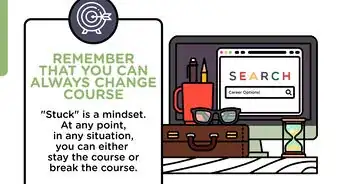This article was co-authored by Adrian Klaphaak, CPCC. Adrian Klaphaak is a career coach and founder of A Path That Fits, a mindfulness-based boutique career and life coaching company in the San Francisco Bay Area. He is also is an accredited Co-Active Professional Coach (CPCC). Klaphaak has used his training with the Coaches Training Institute, Hakomi Somatic Psychology and Internal Family Systems Therapy (IFS) to help thousands of people build successful careers and live more purposeful lives.
There are 14 references cited in this article, which can be found at the bottom of the page.
This article has been viewed 19,088 times.
It’s not always easy to know what you want to do with your life. Faced with so many different options, many people struggle to find a vocation that fills them with a sense of meaning. However, chasing after something worthwhile doesn’t have to be a hopeless prospect. When you’re unsure what you’re meant to be doing, it’s important to remember that you already have the answer you’re searching for. By looking within yourself to identify what’s most important to you and making room for your passions, you can begin to uncover that special thing you were born to do.
Steps
Discovering Your Purpose
-
1Look at the activities that give you pleasure. In order to pinpoint your passion, it’s worth asking yourself how you would spend your day, every day, if you didn’t have other responsibilities to get in the way. Take into account your curiosities, hobbies or favorite activities and see if you can identify a common thread running through them. For instance, if it brings you joy to babysit or coach a little league team, working with children might be what you were meant to do.[1]
-
2Experiment with different activities. Your vocation won’t necessarily be clear to you right away. However, you can inch your way closer to it by trying your hand at a multitude of related jobs or disciplines. You might find that there’s one aspect of a certain field you enjoy more than another, or that learning about a subject in a broad sense helps you narrow your focus to a more specialized niche.[4]
- Volunteering as a student reader might spark a desire to be a teacher, which might make you interested in working with underprivileged students, which could ultimately lead to teaching abroad.
- There are always ways around your circumstances. For example, if football is your consuming interest, but you were injured playing in high school, try getting involved in a different way by going back to school to study exercise science so you can work directly with professional athletes.
Advertisement -
3Ask others what they could see you doing. Sometimes when you get bogged down with your own thoughts, it can help to get some perspective from your loved ones. The people closest to you can offer insight into what they see as your natural talents and highest virtues. These viewpoints can be refreshing if you feel burned out from trying to come up with an answer on your own.[5]
- Pose questions like, “What do you think are my strong suits?” or “In your opinion, what do I care about more than anything else in the world?”
- Your friends and family know you best—in some ways, maybe even better than you know yourself.
-
4Follow your heart. There may be naysayers that come along and tell you what you should be doing with your life, or attempt to belittle your dreams by saying they’re unrealistic. Don’t listen to them. At the end of the day, finding your calling is about being true to yourself.[6]
- You're the only one who can decide how to live your life.
- If you’re constantly worried about what other people may think, it will limit your ability to act in your own best interest.
Acting on Your Calling
-
1Channel your calling into a career. Once you have an idea of your life’s true purpose, it’s time to develop a plan to put it into action. To get started on your journey, look for jobs, internships or educational programs related to your field of interest. The ultimate aim is to be able to make a living doing what you love.[7]
- Study the success of people who get paid to do what you want to be doing.[8]
- It may be necessary to take an indirect route to reach the place where you want to be. For example, if you’re determined to become a world class sushi chef, you might have to start as a line cook in a local Japanese restaurant and work your way up from there.
-
2Turn your passion into a side job. Wearing many hats will sharpen your awareness of what you like to do most. For instance, you might work as a community organizer by day and run your own personal training business in your free time. There’s no need to confine yourself to a single endeavor—in fact, diversity may be the key to contentment for people with wide-ranging interests.[9]
- Having multiple different jobs will not only provide additional sources of income, it can also keep day-to-day tasks from becoming monotonous.
- As you get more invested in your side job, you might be able to find a way to make it your primary line of work.
-
3Pursue your calling as a hobby. If you have a particular set of interests, take every opportunity you can to explore them on your own time, even if you're not getting paid. Whether it’s breeding horses, designing video games or making art, seizing on occasions to indulge your interests is essential for finding contentment.[10]
- You won't always be able to put your dreams into practice professionally, but making room for hobbies you enjoy can be very beneficial to your health and happiness.
- Consider demonstrating your craft via competitions, exhibitions or self-publishing. This will give you a more public outlet for letting the world see what you can do.
Striving for Success
-
1Work hard. Upon discovering your purpose, set your sights on what you want to accomplish and pour everything you have into it. Make it your mission to constantly find new ways to get better, to do more and to be more useful.[11]
- Remember: getting good at anything is a matter of practice. The more time you spend improving your craft, the more of a difference you’ll be able to make.
- It’s pointless to compare yourself to other people. Not everyone has the same capabilities, motivations or desires. Rather than trying on being the best, focus your attention on ticking off your goals.[12]
-
2Put aside your doubts. At times, you’ll be confronted with the fear that you’re not good enough, that people won’t understand you or that you should have settled on a “safer” career. It’s natural to have these kinds of concerns when you’re stressed out or uncertain about what lies in store for your, but they don’t mean that you’re not cut out for your vocation. Learn to recognize them for what they are—insecurity—and keep pushing ahead.[13]
- When you catch yourself experiencing doubt, remind yourself how fortunate you are to able to do what you love most.
- Doubt can sometimes be a sign that you’re better off using your talents some other way. There’s no shame in moving on to something else when you no longer feel as strongly about your passions as you once did.
-
3Don’t obsess over money. While making a living is definitely a necessity, it shouldn’t be the deciding factor in determining how you answer your calling. What’s more important is the satisfaction and sense of purpose your life's work brings you. As long as you're keeping the bills paid, you can continue devoting yourself to more meaningful pursuits.[14]
- Find a side job to supplement your income while you concentrate on the thing that makes you happiest.[15]
- The career that pays a lot may not be right for you, and the career that’s right for you may not pay a lot.
-
4Be prepared to encounter obstacles. Following your calling won’t always be easy. There will be failures, stumbling blocks and heartache along the way, but you shouldn’t let them hold you back. If you truly believe in what you're doing, you’ll stop at nothing to see it through to the best of your ability.[16]
- Take disappointing setbacks in stride, then bounce back and redouble your efforts.
- Think of difficult times as challenges to strengthen your resolve.
- People’s priorities change with time. Don’t be afraid to let yourself evolve naturally. Your might stumble upon a different calling as you grow and accumulate new experiences.
Expert Q&A
Did you know you can get expert answers for this article?
Unlock expert answers by supporting wikiHow
-
QuestionHow do I find out my true calling?
 Adrian Klaphaak, CPCCAdrian Klaphaak is a career coach and founder of A Path That Fits, a mindfulness-based boutique career and life coaching company in the San Francisco Bay Area. He is also is an accredited Co-Active Professional Coach (CPCC). Klaphaak has used his training with the Coaches Training Institute, Hakomi Somatic Psychology and Internal Family Systems Therapy (IFS) to help thousands of people build successful careers and live more purposeful lives.
Adrian Klaphaak, CPCCAdrian Klaphaak is a career coach and founder of A Path That Fits, a mindfulness-based boutique career and life coaching company in the San Francisco Bay Area. He is also is an accredited Co-Active Professional Coach (CPCC). Klaphaak has used his training with the Coaches Training Institute, Hakomi Somatic Psychology and Internal Family Systems Therapy (IFS) to help thousands of people build successful careers and live more purposeful lives.
Career Coach
References
- ↑ https://www.fastcompany.com/3043798/how-to-find-your-calling-when-youre-stuck-in-a-job-you-hate
- ↑ http://www.oprah.com/spirit/what-are-you-meant-to-be-doing-find-your-calling
- ↑ https://www.pickthebrain.com/blog/7-questions-help-discover-lifes-calling/
- ↑ https://www.pickthebrain.com/blog/7-questions-help-discover-lifes-calling/
- ↑ https://tinybuddha.com/blog/find-your-calling-5-steps-to-identify-your-purpose/
- ↑ https://www.forbes.com/sites/jessicahagy/2012/06/26/20-ways-to-find-your-calling/#a2baf625b7d7
- ↑ http://time.com/4289908/callings/
- ↑ https://www.entrepreneur.com/article/276845
- ↑ https://www.forbes.com/sites/jessicahagy/2012/06/26/20-ways-to-find-your-calling/2/#337addda2093
- ↑ http://www.huffingtonpost.com/tama-kieves/how-to-find-your-calling7_b_4714331.html
- ↑ http://www.success.com/blog/success-takes-time-and-hard-work-follow-these-5-steps-to-stick-with-it-to-the-end
- ↑ https://www.forbes.com/sites/jessicahagy/2012/06/26/20-ways-to-find-your-calling/3/#1afa72dc4f44
- ↑ https://tinybuddha.com/blog/find-your-calling-5-steps-to-identify-your-purpose/
- ↑ https://www.inc.com/rhett-power/5-reasons-to-chase-your-dream-not-the-money.html
- ↑ https://www.forbes.com/sites/robasghar/2014/04/02/four-alternatives-to-turning-your-passion-into-a-job/#592fe26d1933
- ↑ https://www.fastcompany.com/3060410/how-ive-learned-to-deal-with-setbacks







































































